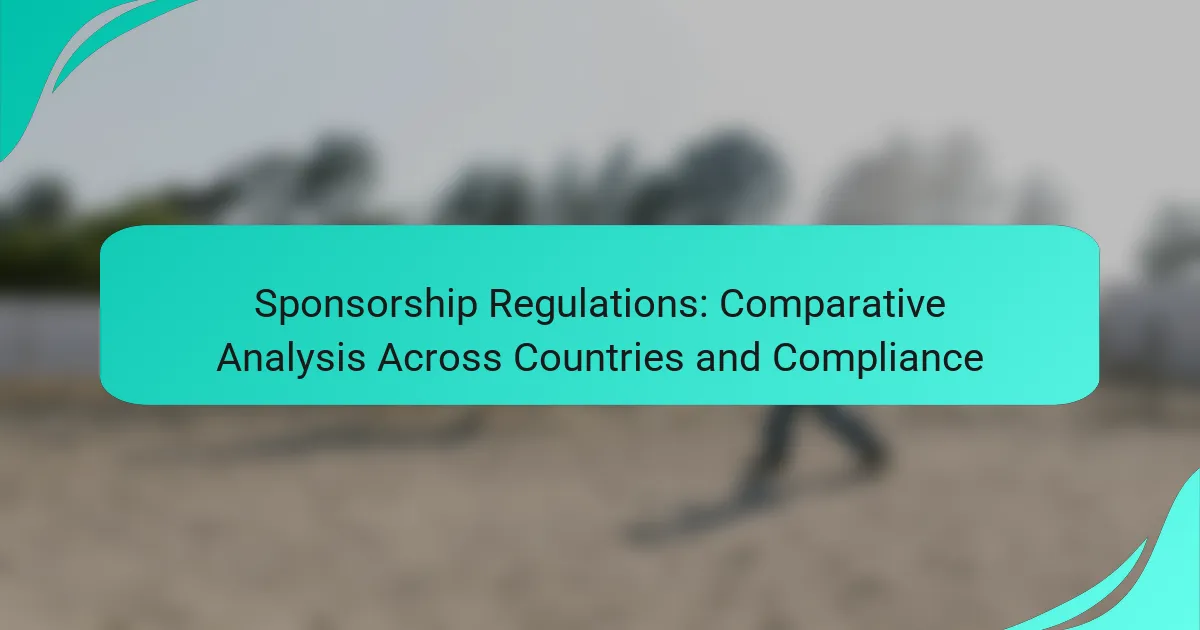This analysis explores the diverse sponsorship regulations across the United States, United Kingdom, and Canada, highlighting the unique frameworks that govern these practices. In each country, regulations aim to promote transparency and ethical conduct, ensuring that both sponsors and consumers are protected. By examining these differences, we can better understand the implications for compliance and the effectiveness of these regulations in fostering fair sponsorship agreements.
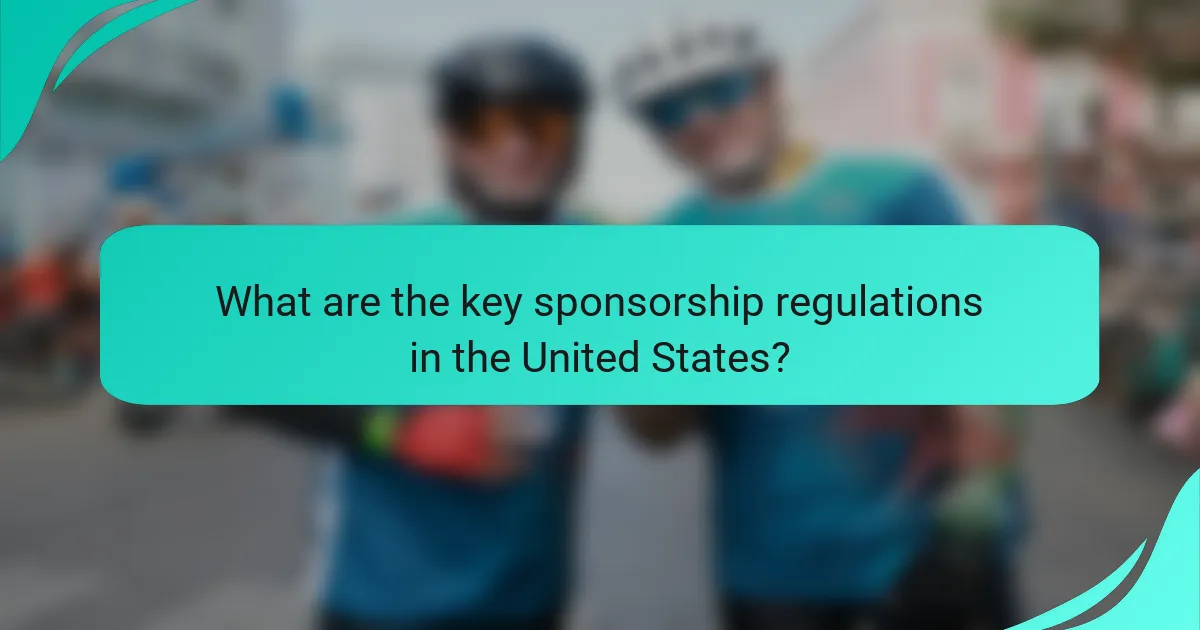
What are the key sponsorship regulations in the United States?
The key sponsorship regulations in the United States primarily involve guidelines from the Federal Trade Commission (FTC), state-specific laws, and industry standards. These regulations ensure transparency and fairness in sponsorship agreements, protecting both consumers and sponsors.
Federal Trade Commission guidelines
The Federal Trade Commission (FTC) provides essential guidelines for sponsorships, particularly regarding disclosure requirements. Sponsors must clearly disclose any material connections between themselves and the endorsers, ensuring that consumers are aware of the sponsorship relationship.
For example, if a social media influencer is paid to promote a product, they must use hashtags like #ad or #sponsored to indicate that the post is a paid endorsement. Failure to comply can result in penalties from the FTC.
State-specific laws
In addition to federal guidelines, individual states may have their own laws governing sponsorships. These laws can vary significantly, with some states imposing stricter disclosure requirements or additional consumer protection measures.
For instance, California has specific regulations that require clear and conspicuous disclosures in advertising, which can affect how sponsorships are presented. It’s crucial for sponsors to understand the laws in each state where they operate to avoid legal issues.
Industry standards
Various industries have established their own standards for sponsorships, which often complement federal and state regulations. These standards aim to promote ethical practices and maintain consumer trust across different sectors.
For example, the Interactive Advertising Bureau (IAB) has guidelines for digital advertising that include best practices for sponsorship disclosures. Adhering to these industry standards not only fosters compliance but also enhances the credibility of the sponsorship efforts.
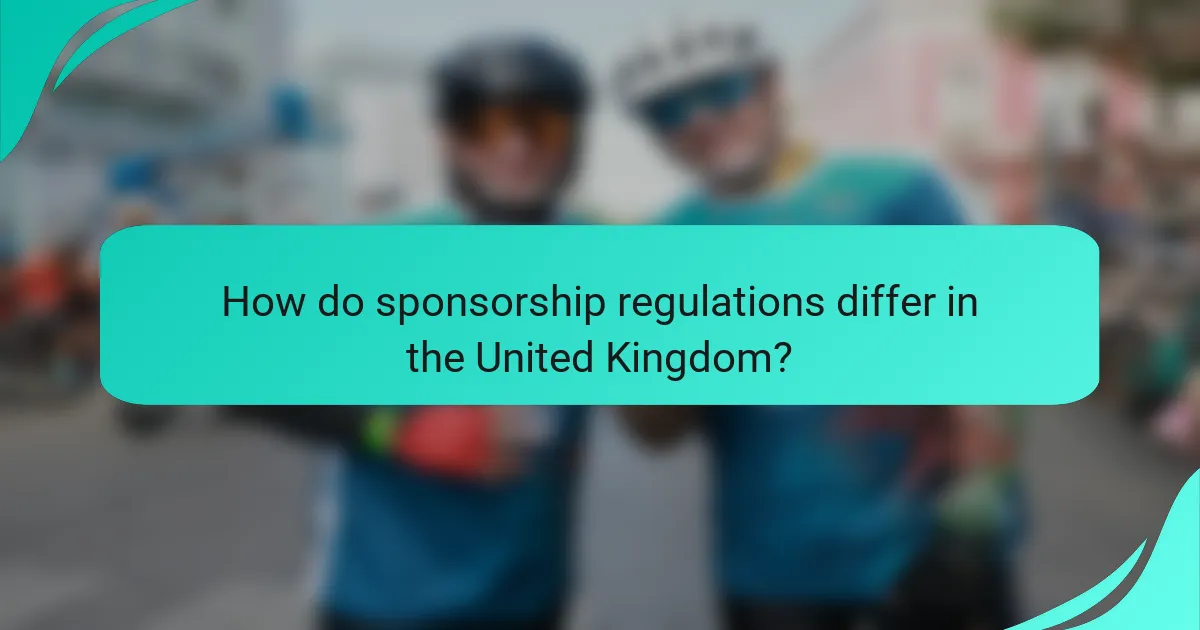
How do sponsorship regulations differ in the United Kingdom?
Sponsorship regulations in the United Kingdom are primarily governed by specific guidelines that ensure transparency and ethical practices. These regulations vary across different sectors, impacting how sponsorships are advertised and managed.
Advertising Standards Authority rules
The Advertising Standards Authority (ASA) sets rules that govern how sponsorships can be promoted in the UK. Advertisements must not mislead consumers about the nature of the sponsorship or the relationship between the sponsor and the sponsored entity.
Key considerations include ensuring that sponsorships are clearly identified and that any claims made are substantiated. For instance, if a brand sponsors a sports event, it should be clear to the audience that the brand is financially supporting the event, avoiding any ambiguity.
Charity Commission guidelines
The Charity Commission oversees sponsorships involving charities, emphasizing the need for transparency and accountability. Charities must ensure that sponsorship arrangements align with their charitable objectives and do not compromise their integrity.
When entering sponsorship agreements, charities should consider factors such as the sponsor’s reputation and the potential impact on their public image. It is advisable to document all sponsorship agreements clearly and ensure that they are compliant with charity law, which may include restrictions on commercial activities.

What are the sponsorship compliance requirements in Canada?
Sponsorship compliance in Canada involves adhering to various advertising standards and provincial regulations. These requirements ensure that sponsorship activities are transparent, ethical, and do not mislead consumers.
Canadian Code of Advertising Standards
The Canadian Code of Advertising Standards sets the baseline for ethical advertising practices, including sponsorships. It emphasizes honesty, accuracy, and fairness in all promotional content, requiring sponsors to disclose any material connections with the sponsored entity.
Key principles include avoiding misleading claims and ensuring that sponsorship messages are clearly identifiable. For example, if a company sponsors an event, it must clearly state its role to avoid any confusion among consumers about the nature of the relationship.
Provincial regulations
In addition to national standards, each province in Canada may have its own regulations governing sponsorships. These regulations can vary significantly, so it is crucial for sponsors to familiarize themselves with the specific rules applicable in their province.
For instance, some provinces may require additional disclosures or have stricter guidelines on advertising to minors. Sponsors should consult local laws to ensure compliance and avoid potential penalties, which can include fines or restrictions on future sponsorship activities.
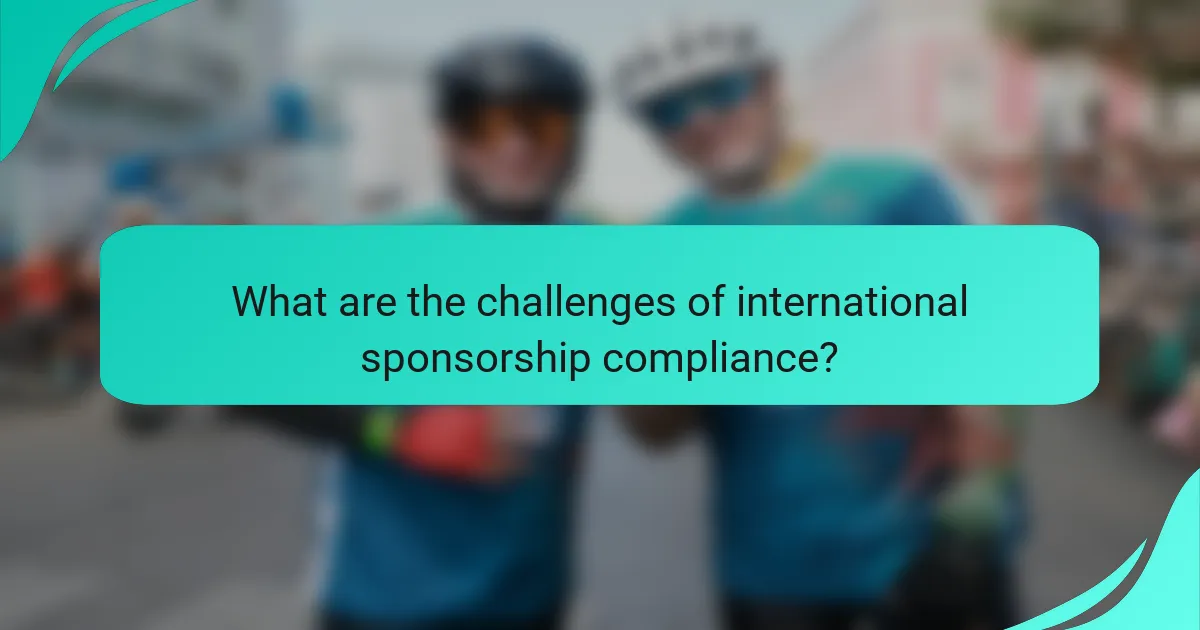
What are the challenges of international sponsorship compliance?
International sponsorship compliance presents challenges due to differing regulations, cultural norms, and advertising standards across countries. Companies must navigate these complexities to ensure their sponsorship activities align with local laws and societal expectations.
Varying legal frameworks
Legal frameworks governing sponsorship can differ significantly from one country to another. For instance, some nations may have strict regulations on sponsorship disclosures, while others may allow more leniency. Companies must be aware of these differences to avoid legal pitfalls and ensure compliance.
In the European Union, for example, sponsorship agreements often require transparency about financial contributions, whereas in the United States, the Federal Trade Commission (FTC) mandates clear disclosures but may not specify the same level of detail. Understanding these nuances is essential for effective international sponsorship management.
Cultural differences in advertising
Cultural attitudes towards sponsorship and advertising can greatly influence compliance strategies. In some cultures, sponsorship may be viewed as a prestigious partnership, while in others, it could be seen as intrusive or inappropriate. Companies should tailor their sponsorship approaches to align with local cultural values.
For example, in countries like Japan, subtlety and respect for tradition are valued, which may require a more understated sponsorship approach. Conversely, in the United States, bold and direct advertising strategies are often more accepted. Companies must adapt their messaging and presentation to resonate with the local audience while maintaining compliance with sponsorship regulations.

How can companies ensure compliance with sponsorship regulations?
Companies can ensure compliance with sponsorship regulations by conducting regular audits of their sponsorship agreements and seeking legal consultations. These practices help identify potential issues and align sponsorship activities with local laws and industry standards.
Regular audits of sponsorship agreements
Regular audits of sponsorship agreements are essential for maintaining compliance with regulations. Companies should review their contracts periodically to ensure they adhere to local laws, such as advertising standards and disclosure requirements. This process can help identify any discrepancies or outdated clauses that may expose the company to legal risks.
During audits, companies should check for compliance with specific regulations, such as the Federal Trade Commission (FTC) guidelines in the United States or the Advertising Standards Authority (ASA) rules in the UK. Establishing a schedule for audits, such as annually or bi-annually, can help maintain oversight and accountability.
Legal consultations
Engaging legal consultations is a crucial step for companies navigating sponsorship regulations. Legal experts can provide insights into the specific laws applicable to sponsorships in different jurisdictions, helping companies understand their obligations. This is particularly important for multinational companies that must comply with varying regulations across countries.
Companies should consider retaining legal counsel with expertise in sponsorship and advertising law. Regular consultations can help address any emerging issues and ensure that sponsorship agreements are structured to minimize legal risks. Additionally, staying informed about changes in regulations can help companies adapt their practices proactively.
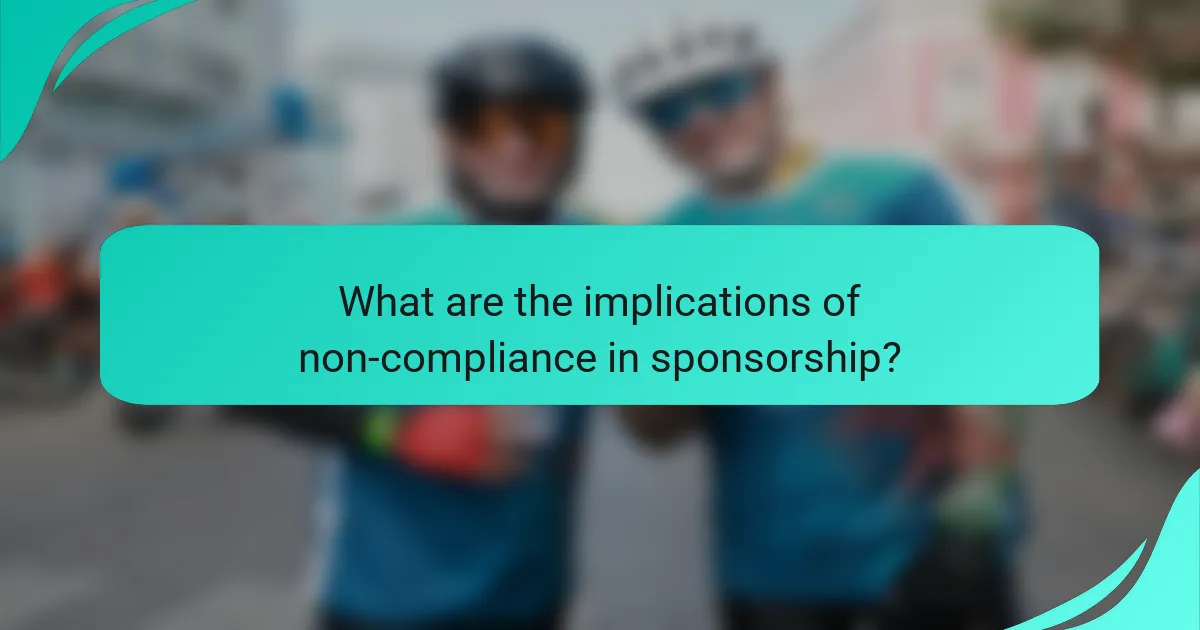
What are the implications of non-compliance in sponsorship?
Non-compliance in sponsorship can lead to serious consequences, including legal penalties and reputational damage. Organizations must understand the risks involved to ensure they adhere to relevant regulations and maintain their credibility.
Legal penalties
Legal penalties for non-compliance in sponsorship can vary significantly by country and jurisdiction. These may include fines, contract termination, or even criminal charges in severe cases. For instance, in the United States, violations of sponsorship regulations can result in fines that range from thousands to millions of dollars, depending on the nature of the offense.
Organizations should familiarize themselves with local laws governing sponsorship agreements. Regular audits and compliance checks can help mitigate the risk of legal issues. Consulting with legal experts is advisable to navigate complex regulations effectively.
Reputational damage
Reputational damage from non-compliance can have long-lasting effects on an organization’s brand and stakeholder trust. Negative publicity can arise from legal actions or public backlash, leading to a loss of customers and partnerships. For example, a company involved in a sponsorship scandal may see a significant drop in sales or customer loyalty.
To protect their reputation, organizations should prioritize transparency and ethical practices in their sponsorship activities. Engaging in proactive communication and addressing any compliance issues promptly can help maintain public trust and mitigate potential fallout.

What frameworks exist for comparing sponsorship regulations?
Various frameworks facilitate the comparison of sponsorship regulations across countries, focusing on compliance, advertising standards, and legal requirements. These frameworks help organizations navigate the complexities of international sponsorship by providing structured guidelines and checklists.
International advertising standards
International advertising standards serve as a baseline for sponsorship regulations, ensuring that promotional activities are ethical and transparent. Key organizations, such as the International Chamber of Commerce (ICC), provide guidelines that many countries adopt or adapt to fit local laws.
For example, the ICC emphasizes truthfulness, non-deception, and respect for human dignity in advertising. Companies should familiarize themselves with these standards to avoid legal pitfalls and maintain brand integrity across different markets.
Cross-border compliance checklists
Cross-border compliance checklists are essential tools for sponsors operating in multiple jurisdictions. These checklists outline specific legal requirements, including registration, disclosure, and reporting obligations that vary by country.
When creating a checklist, consider including items such as local advertising regulations, tax implications, and any necessary permits. Regularly updating this checklist ensures ongoing compliance and helps mitigate risks associated with sponsorship activities.

What emerging trends are shaping sponsorship regulations?
Emerging trends in sponsorship regulations include increased transparency, stricter compliance requirements, and a growing focus on ethical considerations. These trends reflect a global shift towards accountability and responsible marketing practices.
Increased Transparency in Sponsorship Deals
Many countries are now mandating greater transparency in sponsorship agreements, requiring brands to disclose financial arrangements and the nature of partnerships. This trend aims to build trust with consumers and ensure that sponsorships are clearly identified in advertising and promotional materials.
For example, in the European Union, regulations may require brands to label sponsored content distinctly, helping consumers understand when they are being marketed to. This can involve using tags like “paid partnership” or “advertisement” in social media posts.
Stricter Compliance Requirements
Regulatory bodies are implementing stricter compliance measures to ensure that sponsorships adhere to legal standards. This includes guidelines on how sponsorships should be presented and the types of products that can be promoted through sponsorships.
In the United States, the Federal Trade Commission (FTC) has established clear guidelines for influencer marketing, requiring that any material connection between brands and influencers be disclosed. Brands must ensure their sponsorship practices align with these regulations to avoid penalties.
Focus on Ethical Considerations
There is a growing emphasis on ethical considerations in sponsorship practices, particularly regarding the promotion of products aimed at vulnerable populations, such as children. Many organizations are adopting self-regulatory codes to address these concerns.
For instance, in Australia, the Australian Association of National Advertisers has guidelines that discourage sponsorship of unhealthy food products in children’s programming. Brands are encouraged to consider the social impact of their sponsorships and to engage in responsible marketing practices.
